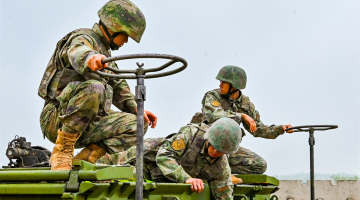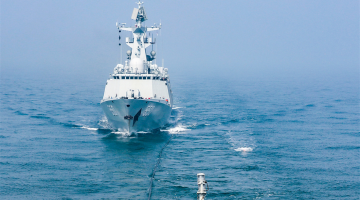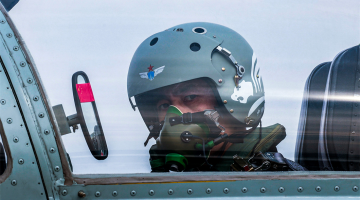Written by Hu Bo, executive director of Maritime Strategy Research Center of the Beijing University
Australian Prime Minister Malcolm Turnbull began his visit to Japan on Jan. 18. Some media stated that Australia and Japan will sign an agreement on military exchange and hold high-level dialogues.
In fact, Australia and Japan have been negotiating military exchange agreements since 2014. Since this agreement represents the institutionalization of defense cooperation between the two countries, it has drawn a lot of media attention.
In a recent statement, Turnbull said that there will be more joint exercises, information sharing and cooperation in the defense industry between Australia and Japan. The signing of this agreement will definitely enhance the military cooperation and bilateral relations between the two sides and expand their radius of effective operations and military capabilities in the Asia-Pacific region.
In recent years, Japan passed the new "Japan-U.S. Guidelines for Defense Cooperation" and the new security legislation. This essentially exceeded the purely defensive defense strategy of Japan.
At the same time, Japan's Self-Defense Force are now actively going to the oceans. While Australia is located at the trans-oceanic hub of Pan-Asia, Japan's cooperation with Australia will significantly enhance its military capabilities in the South Pacific and the East Indian Ocean.
For Australia, its cooperation with Japan will strengthen its capability to respond to the hot issues in the Asia-Pacific region such as the Korean Peninsula, the East China Sea and the South China Sea.
Against the background of Trump's frequent emphasis on the need for allies to strengthen their own defense and assume greater responsibility, the military cooperation between Australia and Japan has a strong motivation of "joint self-improvement".
Japan and Australia are the two most important countries in the Asia-Pacific alliance system of the United States. Playing the roles of "north anchor" and "south anchor," their military cooperation will also have greater impact on the entire U.S.-led system in the Asia-Pacific.
In response to the rise of China and the cost transferring, the U.S. has been encouraging its Asian-Pacific allies and partners since the Obama administration to strengthen their horizontal ties with each other, promote the strengthening of military cooperation between Japan and the ROK, Japan and Australia, Japan and the Philippines, and establish the security network between U.S., Japan and ROK, U.S., Japan and Australia and even U.S., Japan, Australia and India.
Apparently, the cooperation between Japan and Australia is obviously the most important part of the entire security network. Peter Leahy, former chief of the Australian Army, said the agreement is a substantive move by the Quadrilateral Security Dialogue (QSD) between the U.S., Japan, Australia and India.
Although both countries avoided mentioning China in the open discussion on the agreement, the fact of dealing with the so-called "threat from China" has become one of their major objectives.
Geographically, if the military security tie is connected between Japan and Australia, or even between the U.S., Japan, Australia and India, it will exert enormous pressure on the implementation of China's maritime strategy from the outside. It will also greatly contain and interfere with China's maritime strategy. In this regard, China has to be straight forward, since they have no other option.
Of course, this is only a sign. The agreement is still far from a formal military alliance. However, China should maintain its vigilance and attention. But it is not necessary to exaggerate the substantive threat of the agreement. In the specific practice and operation, the ambitions of Australia and Japan are somewhat out of step with the reality of the international situation. It remains to be seen how far Australia and Japan can go.
Building and strengthening the alliance system targeting China based on the island chain is a mentality of full-fledged Cold War. It is not easy to carry out the strategy under current international layout of "a community with a common future in which all countries are interdependent".
There are numerous economic and social ties between China and Japan and China and Australia. China has long been the largest trading partner of Australia and Japan. Therefore, Australia and Japan need to weigh their security concerns and economic interests.
There should be a line drawn when it comes to take precautions against China. For Japan and Australia, it is unrealistic to provoke a comprehensive security confrontation with China and to continue sharing the economic interests of China's rise at the same time.
China has always been good with others, and it won't attack others unless attacked by others. The outside world needs to carefully study China's strategic culture and should not treat China's patience of "seeking harmony as its cause" and its focus on the overall situation as weaknesses.
The risk and the cost are unbearable for any country trying to stimulate China's will to fight at the current strength and scale of China. As long as the Chinese people are determined and united, there is no chain that can lock China.









